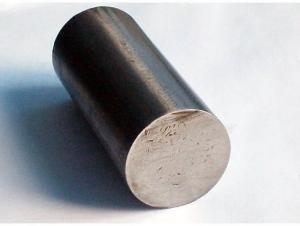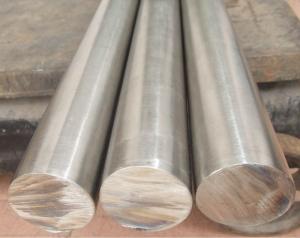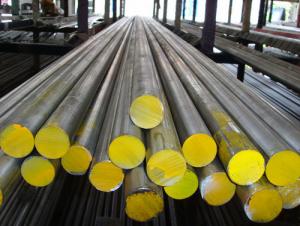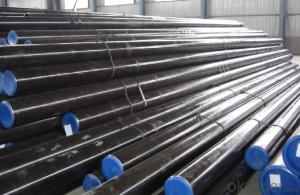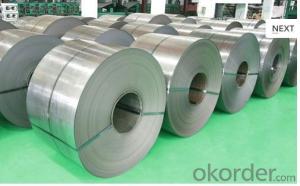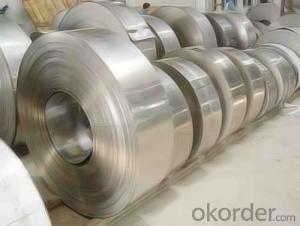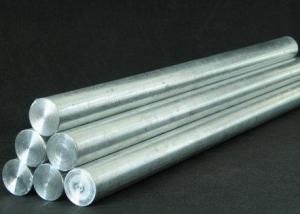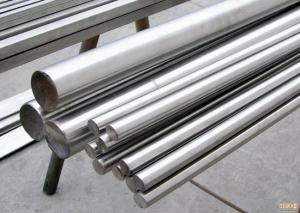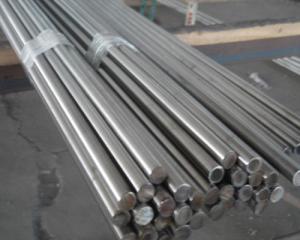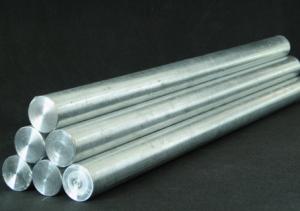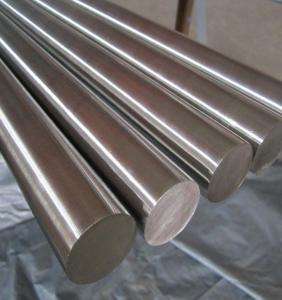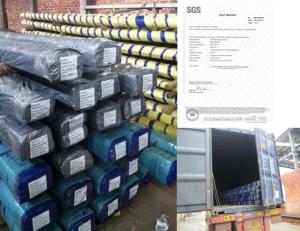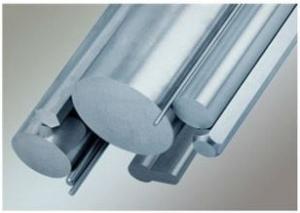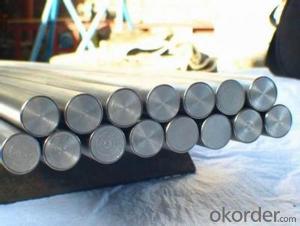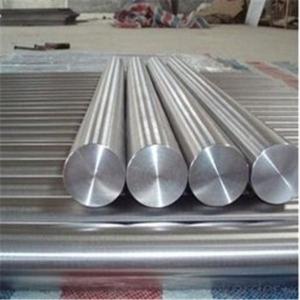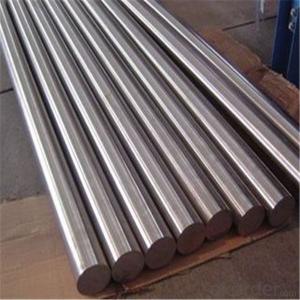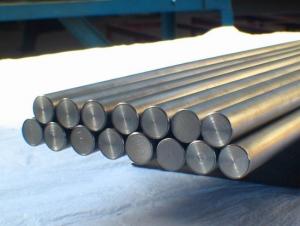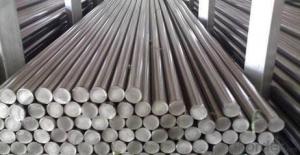304 Stainless Steel Bar
- Loading Port:
- Shanghai Port
- Payment Terms:
- TT or LC
- Min Order Qty:
- 5 Tons m.t.
- Supply Capability:
- 1000 Tons Per Month m.t./month
OKorder Service Pledge
OKorder Financial Service
You Might Also Like
Introduction of 304 Stainless Steel Bar:
Stainless steel is a production which not easy rust, acid resistance and corrosion resistance, so it is widely used in light industry, heavy industry, daily necessities and the decoration industry.my company long-term supply stainless steel porducts including: stainless steel sheet, stainless steel coil and stainless steel tube.
Details of 304 Stainless Steel Bar(Cold Drawing Polished):
*DIA 10mm to 130mm
*FORGE
*DIA 130mm to 300mm
*GB1220,ASTM A 484/484M, EN 10060/ DIN 1013
*DIA 3mm to 60mm
Main operation | Main steel grade | Available size(mm) | Monthly capacity(mt) | Length(mm) | |
OEM | Stainless steel | 40~500 | 1500 | 4000~8000 | |
Hot | 303 303Cu 304/L 310S 316/L 321 416 420 | 12 ~200 | 3000 | 4000~7000 | |
17-4PH WLA510 | 19~110 | 2000 | 4000~7000 | ||
ST Bar | 321 304/L 316/L 310S 17-4PH WLA510 | 19~110 | 2000 | 4000~7000 | |
CD Bar | Round bar | 303 303CU 304/L 316/L 416 420 17-4PH WLA510 | 4.76~100 | 500 | 2500~6500 |
Square bar | 303 303CU 304/L 316/L 416 17-4PH WLA510 | 4.76~75 | 180 | 2500~6500 | |
Hex bar | 303 303CU 304/L 316/L 416 17-4PH WLA510 | 4.76~75 | 180 | 2500~6500 | |
CG Bar | 303 303CU 304/L 316/L 416 420 17-4PH WLA510 | 4.76~100 | 500 | 2500~6500 | |
Features of 304 Stainless Steel Bar:
*Low density
*High specific strength
*High corrosion resistance
*Good thermal stability and plasticity
*It is widely applied for petroleum, chemical, mechanical and electrical, hardware, etc.
Quality assurance of 304 Stainless Steel Bar:
All of the products are detected by ultrasound making sure that no defects inside the products. Besides, chemical composition, mechanical properties and high-powered organization are also strictly controlled, ensuring our clients get the best products.
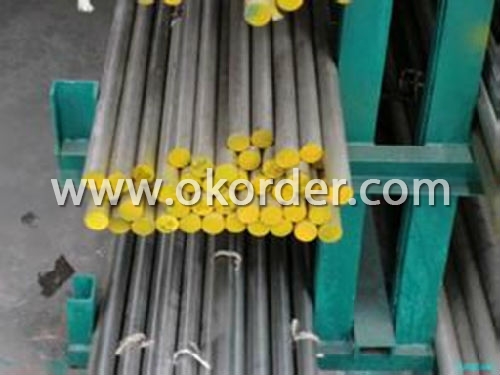
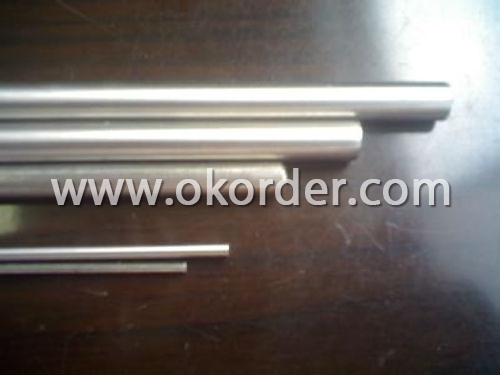
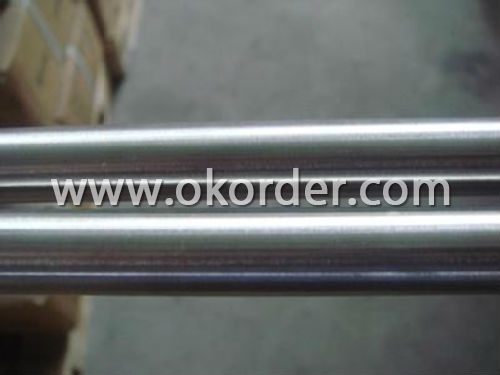
- Q:What are the different types of stainless steel bars used in pharmaceutical equipment?
- Pharmaceutical equipment commonly utilizes various types of stainless steel bars due to their exceptional corrosion resistance and hygienic properties. Among the most frequently employed types are: 1. Austenitic Stainless Steel: This stainless steel variant boasts widespread usage in pharmaceutical equipment due to its superior corrosion resistance and remarkable formability. Its composition, enriched with substantial amounts of chromium and nickel, grants it resistance against diverse chemicals, rendering it ideal for applications necessitating optimal hygiene. 2. Martensitic Stainless Steel: Distinguished by its notable strength and hardness, this stainless steel variant contains a higher carbon content than austenitic stainless steel, endowing it with its characteristic robustness. Pharmaceutical equipment reliant on high mechanical strength often incorporates martensitic stainless steel. 3. Ferritic Stainless Steel: Renowned for its exceptional resistance to stress corrosion cracking and oxidation, ferritic stainless steel contains elevated levels of chromium, which confers commendable corrosion resistance. Pharmaceutical equipment requiring high temperature resistance frequently employs ferritic stainless steel. 4. Duplex Stainless Steel: By combining the properties of austenitic and ferritic stainless steels, duplex stainless steel strikes a balance between the two. It offers excellent corrosion resistance, high strength, and favorable weldability. Pharmaceutical equipment necessitating both corrosion resistance and strength often incorporates duplex stainless steel. The specific stainless steel bar employed in pharmaceutical equipment depends on the unique requirements of the application, including the chemicals or substances it may encounter, the desired level of hygiene, and the necessary mechanical strength.
- Q:What are the common surface finishes for stainless steel bars?
- The common surface finishes for stainless steel bars include mill finish, brushed finish, mirror finish, and satin finish.
- Q:What is the melting point of stainless steel bars?
- The melting point of stainless steel bars may differ depending on the specific grade or composition of the stainless steel. Typically, stainless steel possesses a higher melting point in comparison to other steel types due to the presence of alloying elements like chromium, nickel, and molybdenum. Generally, the melting point of stainless steel bars falls within the range of approximately 1400 to 1450 degrees Celsius (2552 to 2642 degrees Fahrenheit). Nonetheless, it is important to bear in mind that varying grades of stainless steel might exhibit slightly different melting points. Therefore, it is always advisable to refer to the specific technical data sheet or manufacturer's information for precise melting point values.
- Q:Can stainless steel bars be used in cryogenic storage tanks?
- Yes, stainless steel bars can be used in cryogenic storage tanks. Stainless steel is known for its excellent resistance to low temperatures and is commonly used in cryogenic applications. It can withstand the extreme cold temperatures required for cryogenic storage without losing its structural integrity or deteriorating. Stainless steel bars are often used in the construction of cryogenic storage tanks due to their high strength, corrosion resistance, and ability to maintain their mechanical properties at low temperatures. Additionally, stainless steel has a low thermal conductivity, which helps to minimize heat transfer between the stored contents and the external environment. This makes stainless steel bars a suitable and reliable choice for use in cryogenic storage tanks.
- Q:Can stainless steel bars be used in the hospitality industry?
- Yes, stainless steel bars can be used in the hospitality industry. Stainless steel is known for its durability, resistance to corrosion, and easy maintenance, making it an ideal material for bars in hotels, restaurants, and other hospitality establishments. Stainless steel bars are not only aesthetically pleasing but also hygienic, as they can withstand frequent cleaning and disinfecting. Additionally, stainless steel's strength and versatility allow for the creation of various bar designs and configurations to suit the needs and preferences of different establishments.
- Q:Are stainless steel bars suitable for industrial pumps?
- Yes, stainless steel bars are suitable for industrial pumps. Stainless steel is highly resistant to corrosion, which makes it ideal for use in pumps that handle corrosive fluids or operate in harsh environments. Additionally, stainless steel bars offer excellent strength and durability, ensuring reliable performance and longer pump life.
- Q:What are the advantages of using stainless steel bars?
- There are several advantages to using stainless steel bars. Firstly, stainless steel bars have high corrosion resistance, making them suitable for use in harsh environments or applications where exposure to moisture or chemicals is common. Additionally, stainless steel bars have excellent strength and durability, allowing them to withstand heavy loads and extreme temperatures. Moreover, stainless steel bars are low maintenance and easy to clean, making them ideal for applications where hygiene is important, such as in the food and medical industries. Lastly, stainless steel bars have an attractive appearance and can be easily shaped and fabricated to meet specific design requirements.
- Q:Can stainless steel bars be used in food processing applications?
- Stainless steel bars are indeed applicable for food processing purposes. The food industry widely relies on stainless steel due to its exceptional resistance to corrosion, ability to withstand high temperatures, and hygienic nature. Its ease of cleaning and sanitization further qualifies it as an appropriate material for food processing machinery and equipment, including conveyor systems, tanks, storage containers, and cutting tools. Stainless steel bars are commonly employed in constructing frames, supports, and structures for such applications. Furthermore, stainless steel does not react with food and does not introduce any unwanted taste or odor, thus ensuring the preservation of the food's quality and integrity throughout the processing.
- Q:Can stainless steel bars be used in chemical processing equipment?
- Yes, stainless steel bars can be used in chemical processing equipment. Stainless steel is known for its corrosion resistance properties, making it an excellent choice for handling various chemicals and corrosive environments in the chemical processing industry.
- Q:What are the different types of stainless steel bars used in architectural railing systems?
- There are several types of stainless steel bars that are commonly used in architectural railing systems. The most common types include: 1. Round bars: These are solid cylindrical bars that are often used for their aesthetic appeal. They are available in various diameters and are often used for handrails or grab bars. 2. Square bars: These bars have a square cross-section and are often used for their modern and clean look. They are commonly used in applications such as balusters or posts in railing systems. 3. Flat bars: These bars have a rectangular cross-section and are often used for their versatility and ease of installation. They can be used for various components in railing systems, including top rails, bottom rails, or even infill panels. 4. Hollow bars: These bars have a hollow center and are often used for their lightweight and cost-effective properties. They are commonly used for infill panels or as spindles in railing systems. 5. Slotted bars: These bars have slots cut along their length, allowing for increased airflow and visibility. They are often used in applications such as glass railing systems or as infill panels. It is important to note that the type of stainless steel used for these bars can vary, with the most common grades being 304 and 316. The choice of stainless steel grade depends on factors such as the environment, corrosion resistance requirements, and budget. Overall, the selection of the stainless steel bar type depends on the specific architectural railing system design, functionality, and aesthetic preferences.
1. Manufacturer Overview |
|
|---|---|
| Location | Zhejiang,China |
| Year Established | 2000 |
| Annual Output Value | Above US$8.3 Million |
| Main Markets | Europe, America |
| Company Certifications | ISO9001:2000 |
2. Manufacturer Certificates |
|
|---|---|
| a) Certification Name | |
| Range | |
| Reference | |
| Validity Period | |
3. Manufacturer Capability |
|
|---|---|
| a)Trade Capacity | |
| Nearest Port | Shanghai |
| Export Percentage | 30% |
| No.of Employees in Trade Department | 30 People |
| Language Spoken: | English;Chinese |
| b)Factory Information | |
| Factory Size: | Above 80,000 square meters |
| No. of Production Lines | Above 7 |
| Contract Manufacturing | OEM Service Offered;Design Service Offered |
| Product Price Range | Average |
Send your message to us
304 Stainless Steel Bar
- Loading Port:
- Shanghai Port
- Payment Terms:
- TT or LC
- Min Order Qty:
- 5 Tons m.t.
- Supply Capability:
- 1000 Tons Per Month m.t./month
OKorder Service Pledge
OKorder Financial Service
Similar products
New products
Hot products
Hot Searches
Related keywords
